
The story of Anchor Brewery begins shortly after gold was discovered in nearby Sutter’s Mill. That’s when German brewer “Gottlieb Brekle arrived in San Francisco with his wife Marie and infant son Frederick.” In 1854, Brekle applied for U.S. citizenship and 1871 bought an old beer-and-billiards saloon near Russian Hill. That location became “a little San Francisco brewery on Pacific, between Larkin and Hyde,” and 25-years later was known as Anchor Brewery.
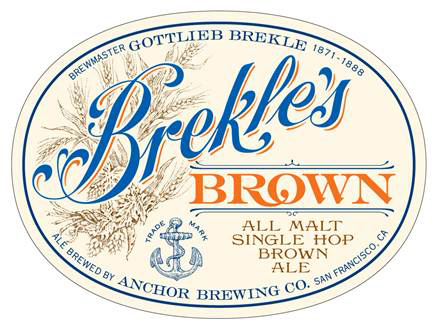
On February 16, Anchor will unveil it’s newest beer, an all-malt, single hop brown ale named for the original Anchor brewer, Gottlieb Brekle, who was brewmaster from 1871 to 1888. Brekle’s Brown will then be available on draft only at select locations throughout the Bay Area for the remainder of SF Beer Week from February 17-20. Look for it at better beer bars everywhere.
Beer In Ads #305: For Real Enjoyment … Turn This Ad Slowly To The Right

Monday’s ad is a clever one for Schaefer showing a bottle of Schaefer beer and a beer glass at right angles, with the instructions “For real enjoyment … turn this ad slowly to the right.” Which, if real, would pour the beer into the glass. It’s also interesting that Schaefer is positioning themselves by saying “it’s real beer.” The ad isn’t dated, so I don’t know when it was from or who they would have been subtly targeting as being not real beer with that statement.
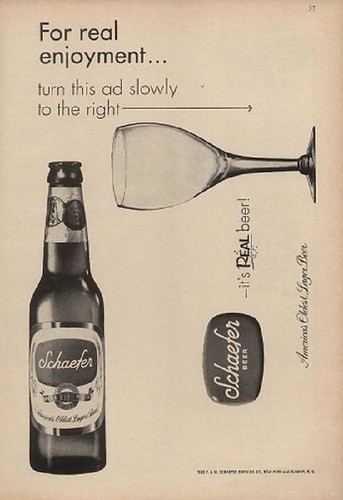
Brookston Football Pool Winners
![]()
With a most satisfying conclusion to the Super Bowl yesterday, the winners of the Brookston Football Pools 2010 have been decided. Congratulations to everyone who played this year, the winners are:
Pick ‘Em League
- nighthops (174)
- Austin Hopheads (165)
- TIE: Beerguy101, HoldFastBrewery (160)
- TIE: The Beer Runners, bbbilly, GreenMachine-MWA, OakshireMatt (158)
- Piranha Pale Riders (157)
- Mr. Nuts (156)
- Bakersfield Bills (155)
- TIE: Beerman49, Hopstain (154)
- Little Guy (152)
- TIE: Fort Braggers, Pour Curator (151)
Congratulations to Lucas (a.k.a. nighthops). He took an early lead and never let go.
This was the first year they kept the picks going through the playoffs. It looks like next year, we’ll be able to assign more points for correct playoff picks which could keep thinks lively down to the end. I’m thinking it would make sense for Wildcard week to be worth 2, then 3, then 4 and finally 5 (or more?) for picking the Super Bowl winner.
Survivor League
It took 16 weeks before a winner emerged. In fact, two of the remaining three were both knocked out that week — GreenMachina-WMA and Hopstain. That allowed DOZEer to become the winner, having only one miss for the entire season.
Congratulations to Paul (a.k.a. DOZEer) for the being the lone survivor.
Thanks to everybody who played. See you next year.
Wikio Beer Blog Rankings For February 2011

The February 2011 standings are out for Wikio’s Beer Blogs. For a third straight month, I’m still hanging on to the top spot. Here’s what happened to the Top 20 over last month:
Wikio February 2011 Beer Blog Rankings
| 1 | Brookston Beer Bulletin (+/-0) |
| 2 | Beervana (+/-0) |
| 3 | Brewpublic (+1) |
| 4 | The New School (-1) |
| 5 | Appellation Beer: Beer From a Good Home (+/-0) |
| 6 | Washington Beer Blog (+5) |
| 7 | A Good Beer Blog (-1) |
| 8 | The Not So Professional Beer Blog (Not in Top 20 for Jan.) |
| 9 | It’s Pub Night (+11) |
| 10 | Seattle Beer News (+8) |
| 11 | Drink With The Wench (-3) |
| 12 | BetterBeerBlog (-3) |
| 13 | Beer 47 (Not in Top 20 for Jan.) |
| 14 | Brewed For Thought (+1) |
| 15 | KC Beer Blog (+4) |
| 16 | The Session Beer Project (Not in Top 20 for Jan.) |
| 17 | Seen Through a Glass (-4) |
| 18 | Burgers & Brews (-8) |
| 19 | I Love Beer (Not in Top 20 for Jan.) |
| 20 | An Ear For Beer (Not in Top 20 for Jan.) |
Ranking made by Wikio
I again added the relative movements of each blog from last month. This month, four new blogs cracked the Top 20, and four dropped off. Again, I’ll keep stressing that it’s just a bit of fun so long as we don’t take it too seriously.
Massachusetts Beer
![]()
Today in 1788, Massachusetts became the 6th state.
Massachusetts

Massachusetts Breweries
- 50 Back
- Amherst Brewing
- Barleycorn’s Craft Brew
- Barrington Brewery
- Berkshire Brewing
- Blue Hills Brewery
- Boston Beer Co.
- Boston Beer Co. (Corporate)
- Boston Beer Works
- The Brewery Exchange
- The Brewmaster’s Tavern
- Buzzards Bay Brewing (now brewing as “Just Beer”)
- Cambridge Brewing
- Cape Ann Brewing
- Cape Cod Beer
- Cisco Brewers
- Cody Brewing
- Deadwood Cafe & Brewery
- Deja Brew BOP
- Element Brewing
- Endurance Brewing
- Gardner Ale House Brewery & Restaurant
- Harpoon Brewery
- Haverhill Brewery
- High & Mighty Beer Co.
- Hyland Orchard Brewery
- Idle Hands Craft Ales
- John Harvard’s
- Just Beer
- Lefty’s Brewing
- Lowell Brewery
- Mayflower Brewing
- Mercury Brewing
- Moonshot Beer
- Mystic Brewery
- Nashoba Valley Brewery
- New Century Brewing
- Northampton Brewery
- Notch Session Ale
- Nowhere Brewing
- Offshore Ale
- Opa Opa Steakhouse & Brewery
- Paper City Brewery
- Peak Organic Brewing
- People’s Pint
- Pioneer Brewing
- Pittsfield Brew Works
- Pretty Things Beer & Ale Project
- Rapscalion Brewery
- Rock Bottom
- Salem Beer Works
- Samuel Adams
- Sherwood Forest Beer
- Sommerville Brewing
- The Tap Brewpub
- Wachusett Brewing
- Wandering Star Brewing
- Watch City Brewing
- Wormtown Brewery
Masschusetts Brewery Guides
Guild: Massachusetts Brewers Guild
State Agency: Massachusetts Alcoholic Beverage Control Commission

- Capital: Boston
- Largest Cities: Boston, Worcester, Springfield, Lowell, Cambridge
- Population: 6,349,097; 13th
- Area: 10,555 sq.mi., 44th
- Nickname: The Bay State
- Statehood: 6th, February 6, 1788
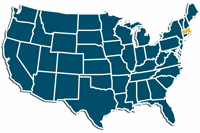
- Alcohol Legalized: December 5, 1933
- Number of Breweries: 40
- Rank: 15th
- Beer Production: 4,265,155
- Production Rank: 14th
- Beer Per Capita: 20.3 Gallons

Package Mix:
- Bottles: 49.8%
- Cans: 39.4%
- Kegs: 10.5%
Beer Taxes:
- Per Gallon: $0.11*
- Per Case: $0.24*
- Tax Per Barrel (24/12 Case): $3.30*
- Draught Tax Per Barrel (in Kegs): $3.30*
- * plus sales tax (an exemption ended in 2009)
Economic Impact (2010):
- From Brewing: $507,113,526
- Direct Impact: $1,951,782,007
- Supplier Impact: $1,379,865,866
- Induced Economic Impact: $1,153,744,790
- Total Impact: $4,485,392,664
Legal Restrictions:
- Control State: No
- Sale Hours: On Premises: 8:00 a.m.–2:00 a.m. by state law, although individual cities and towns may prohibit sales before 11:00 a.m. and after 11:00 p.m. Not before 11:00 a.m. on Sunday.
Off Premises: 8:00 a.m.–11:00 p.m., or 8:00 a.m.–11:30 p.m. on the day before a holiday. Not before noon on Sunday. - Grocery Store Sales: Yes
- Notes: No individual, partnership, or corporation may have more than three off-premises licences in the state, nor more than two in any city, nor more than one in any town. No individual, partnership, or corporation not resident or headquartered in Massachusetts may apply for a license, although one may devolve upon such a corporation.
On-premises regulations: No discounts at specific times (i.e. no “Happy Hour” discounts) or for specific individuals, no fixed-price open bar or all-you-can-drink (except at private functions), no more than two drinks per individual at any one time, no pitchers for fewer than two people, no drinking contests, no drinks as prizes, no free drinks.
Off-premises sale of alcohol is prohibited on the last Monday in May (Memorial Day), Thanksgiving Day, Christmas Day, and the day after Christmas if Christmas falls on a Sunday.[6]
Sale of alcohol is prohibited during polling hours on election days (subject to local exceptions).[6]
“Malt beverages” defined as having not more than 12% alcohol by weight.
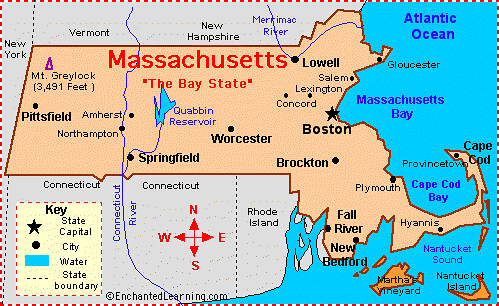
Data complied, in part, from the Beer Institute’s Brewer’s Almanac 2010, Beer Serves America, the Brewers Association, Wikipedia and my World Factbook. If you see I’m missing a brewery link, please be so kind as to drop me a note or simply comment on this post. Thanks.
For the remaining states, see Brewing Links: United States.
Wisconsin Food Pyramid

I imagine the “Wisconsin Food Pyramid” was originally meant to be derogatory, but what could be a better meal for a football game than sausages (cooked in beer), cheese and beer? That’s what I’m having at my Super Bowl party, along with chips, pretzels and more cheese. And Sean Paxton, the Homebrew Chef, has promised to bring Shepherd’s Pie. Yum. Go Packers!
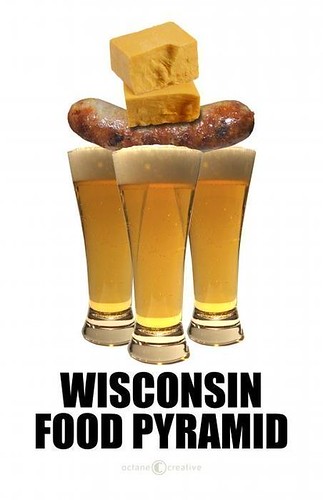
Guinness Ad #54: Baby Kangaroo
![]()
Our 54th Guinness poster by John Gilroy shows a kangaroo whose joey has been replaced by a pint of Guinness. Though surprisingly she looks quite pleased about the switcheroo.
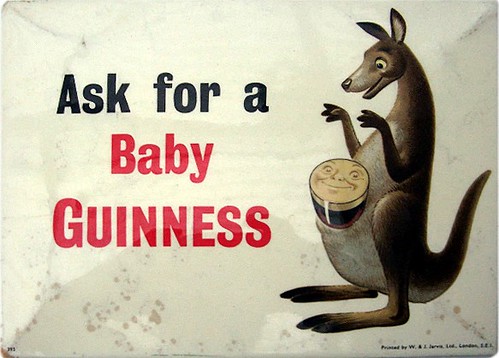
Pliny the Younger 2011

Yesterday was Pliny the Younger Day at Russian River Brewing in Santa Rosa, California. I arrived a little before eleven, and owner/brewer Vinnie Cilurzo let me in the back of the brewpub. The difference between last year’s release day and this year’s was immediately apparent. There was relative calm in the place, the bar was not three or four deep, with people pushing against the bar clamoring for attention. Perhaps most importantly, both Vinnie and Natalie seemed relaxed, too.
Last year, you may recall, Russian River sold out of of Pliny the Younger, their Triple IPA that’s released just once each year, in just eight short hours. The brewpub was filled to the gills and the staff was understandably stressed and exhausted. The main reason this happened last year was nobody expected so many people to order growlers, and having placed few restrictions on them, they continued to honor orders until the entire supply of beer ran out.
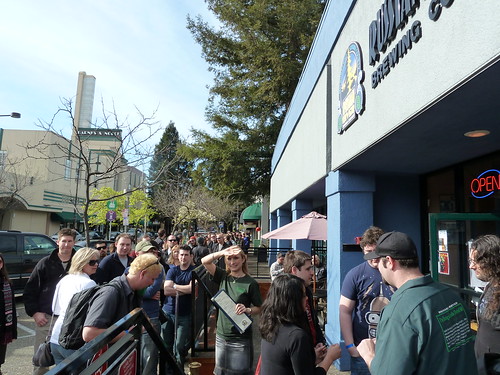
Having learned from last that experience, this year no Pliny the Younger growlers were permitted. They also managed the door and made sure it was never too crowded inside, which made for a much more enjoyable experience. A line of people that stretched down most of the block outside waited patiently for their turn to come inside. As people left, a new customer took their place so there was a steady stream of new patrons.
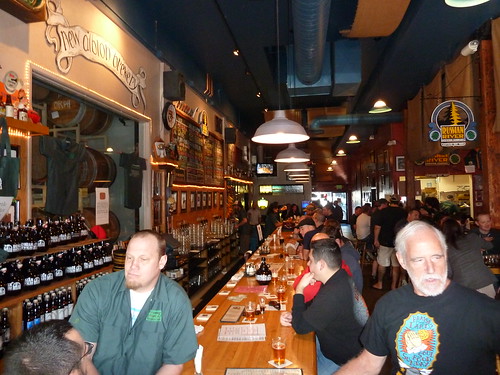
I actually thought this year’s Pliny the Younger was even better than last year. It seemed more balanced and the hop wallop wasn’t as vegetal or oniony as I remember it being last year. There is nothing quite like having it fresh from the source on the day it’s released. And this year, they’ve allocated enough beer so it will be available for at least two weeks, giving many more people a chance to try get some.
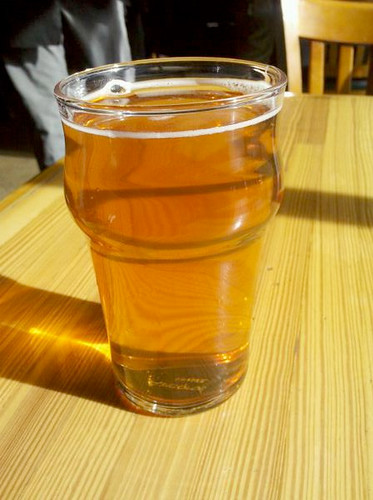
It will also begin appearing in select accounts around the Bay Area, so keep an eye on your favorite water hole. But act fast, last year kegs of Pliny the Younger kicked at some bars in a matter of hours.
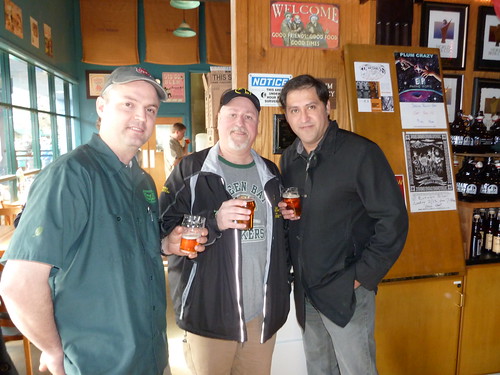
Vinnie Cilurzo, me and Joe Tucker (from Rate Beer) enjoying a day at Russian River Brewing.
Below is a slideshow of Pliny the Younger Day. This Flickr gallery is best viewed in full screen. To view it that way, after clicking on the arrow in the center to start the slideshow, click on the button on the bottom right with the four arrows pointing outward on it, to see the photos in glorious full screen. Once in full screen slideshow mode, click on “Show Info” to identify each photo.
Beer In Ads #304: Pabst Blue Ribbon Touch

Friday’s ads feature two for Pabst Blue Ribbon from 1956. Both are spot color ads depicting a blindfolded man tasting Pabst and declaring “This one has the touch,” whatever that means.

Below each photo it also reads. “Unmistakable! The taste with the Pabst Blue Ribbon touch.”

Session #48: Bottle, Can, Keg or Cask?
![]()
![]()
![]()
![]()
Our 48th Session is hosted by Simon Johnson of the Reluctant Scooper. He’s chosen as his topic the age-old question about which package is best: “Cask, Keg, Can, Bottle?.”
The method of beer dispense often raises the hackles of even the most seasoned beer drinker. Some evangilise about living, breathing cask as being the one true way. Others heartily support the pressurised keg. The humble tinny has its fans. Lovers of bottled beer, either conditioned or pasturised, can be equally voiciferous.
Perhaps you think that one method magnifiies a beer’s impact. Perhaps you won’t try a beer if it’s dispensed in a way you don’t agree with. Perhaps you’ve tried one beer that’s been dispensed every which way.
The question is simple but your answer may not be: Cask, Keg, Can, Bottle: Does dispense matter

I’m not necessarily a champion of any one beer delivery system over the rest. It seems to me that each contributes something to the final product, the beer. And while I applaud CAMRA’s efforts, especially early on, they seem to be stuck in the past these days continuing to promote the idea that cask beer is the only beer, whereas many forward-thinking British brewers are making great beer that’s kegged and bottled. I personally feel they should embrace any beer that tastes good and lose their preoccupation with one delivery system. (I have been a member of CAMRA, but my membership is currently lapsed.) I should also say that’s only how CAMRA seems to me from 5,000 miles away, it’s just my perception. I could be totally off base on that.
![]() That being said, I must confess a weakness for cask beer, and generally order a beer on cask or in a firkin if a bar offers one. But that has more to do with wanting to encourage every bar, or at least all the good ones, to keep at least some cask or firkin beer on their menu. That, and cask beer in the U.S. is still uncommon enough that I still get excited when I discover that a new place has some. I suspect if I lived in England where it is far more common, that my choices might be different. Certainly whenever I visit the UK I rarely order beer that’s not on cask, unless it’s something special that’s not available on cask, as is increasingly the case from small artisanal British and Scottish brewers.
That being said, I must confess a weakness for cask beer, and generally order a beer on cask or in a firkin if a bar offers one. But that has more to do with wanting to encourage every bar, or at least all the good ones, to keep at least some cask or firkin beer on their menu. That, and cask beer in the U.S. is still uncommon enough that I still get excited when I discover that a new place has some. I suspect if I lived in England where it is far more common, that my choices might be different. Certainly whenever I visit the UK I rarely order beer that’s not on cask, unless it’s something special that’s not available on cask, as is increasingly the case from small artisanal British and Scottish brewers.
I really do love cask beer, especially when comparing the same beer on cask and on keg or bottled. While many people complain about cask beer seeming flat, I think the lack of carbonation allows you to taste more of the flavors of the beer that are often masked by the CO2 in non-cask beer.
![]() Which brings us to kegs, which for many, many beers work just fine, as far as I’m confirmed. Certainly nitrogen kegs have a smooth taste as a generality and many regular CO2 kegs have that bubbly carbonation that for some beers works quite well, many lager styles for example seem to me to be improved by the carbonation, which give them a cleanliness of sorts — scrubbing bubbles is how I often think of them.
Which brings us to kegs, which for many, many beers work just fine, as far as I’m confirmed. Certainly nitrogen kegs have a smooth taste as a generality and many regular CO2 kegs have that bubbly carbonation that for some beers works quite well, many lager styles for example seem to me to be improved by the carbonation, which give them a cleanliness of sorts — scrubbing bubbles is how I often think of them.
![]() Bottles, of course, allow us to be able to drink many more beers from around the country and the world because they make it possible for the beer to travel farther and last longer. Of course, clear bottles and green bottles pervert those advantages with new problems, but brown seems to do a pretty good job. I once read that red bottles would actually offer the most UV light protection, but apparently they’re prohibitively expensive for some reason (or perhaps it’s just a matter of little or no demand?). I’ve actually only seen one red bottle, which was a specialty beer I picked up at the Trumer Brauerei in Salzburg, Austria. I’ve also seen white and blue bottles, too, but have no idea how they compare.
Bottles, of course, allow us to be able to drink many more beers from around the country and the world because they make it possible for the beer to travel farther and last longer. Of course, clear bottles and green bottles pervert those advantages with new problems, but brown seems to do a pretty good job. I once read that red bottles would actually offer the most UV light protection, but apparently they’re prohibitively expensive for some reason (or perhaps it’s just a matter of little or no demand?). I’ve actually only seen one red bottle, which was a specialty beer I picked up at the Trumer Brauerei in Salzburg, Austria. I’ve also seen white and blue bottles, too, but have no idea how they compare.
Then, of course, there’s bottle-conditioned beers, with live yeast in them that continue to ferment in the bottle. For me, they’re the preferred bottle for many, if not, most styles of beer. Interestingly, the Sierra Nevada Pale Ale in bottles — which is bottle-conditioned — uses a slightly different recipe for their kegged pale ale, and have been experimenting with essentially a keg-conditioned version that they’re hoping will more closely approximate the bottled version.
![]() Of course, the question also leaves out the hybrid package: growlers. Growlers are essentially a hand-bottled keg or cask beer that you can take home with you, but you have only a day or two in which to drink it. So it’s not exactly the best of both worlds, but it is a great way to try a draft-only beer in another setting.
Of course, the question also leaves out the hybrid package: growlers. Growlers are essentially a hand-bottled keg or cask beer that you can take home with you, but you have only a day or two in which to drink it. So it’s not exactly the best of both worlds, but it is a great way to try a draft-only beer in another setting.
![]() Cans are the wild card, I think. For so long, they were dismissed as a package. Back in the early days, brewers and other beer folk (myself included) hailed the brown beer bottle as the package for craft beer. So convincing was the argument at the time that I think it’s actually slowed the acceptance of craft beer in cans. Because the issues of beer in cans — specifically metal turbidity, which is metal leeching into the beer — have been largely solved. And beyond that, cans have many advantages over bottles. I’ve been involved in several side-by-side tastings of canned vs. kegged beer and the consensus in every case has been that no discernible difference can be detected. Is anyone yet doing a can-conditioned beer?
Cans are the wild card, I think. For so long, they were dismissed as a package. Back in the early days, brewers and other beer folk (myself included) hailed the brown beer bottle as the package for craft beer. So convincing was the argument at the time that I think it’s actually slowed the acceptance of craft beer in cans. Because the issues of beer in cans — specifically metal turbidity, which is metal leeching into the beer — have been largely solved. And beyond that, cans have many advantages over bottles. I’ve been involved in several side-by-side tastings of canned vs. kegged beer and the consensus in every case has been that no discernible difference can be detected. Is anyone yet doing a can-conditioned beer?
In the end, yes, I think the package does matter, but not to the point where I’d ever pass on a beer on that basis alone. Ultimately, it’s what the beer tastes like that’s most important. The package may determine that to some extent, and some do a better job with certain beers, but enough certainly seem suited to their primary package for it not to matter. As long as it ends up in my glass, I’m going to drink it, and I’ll probably enjoy it, too.
